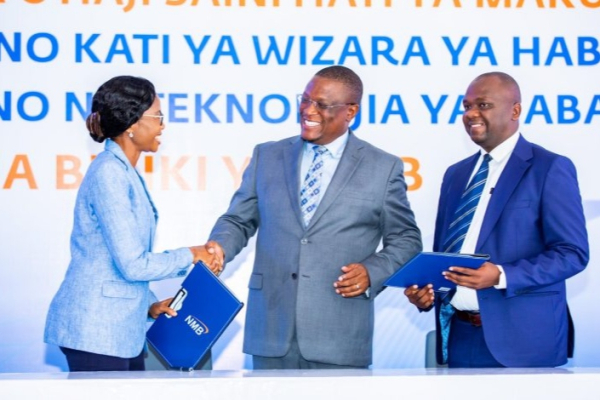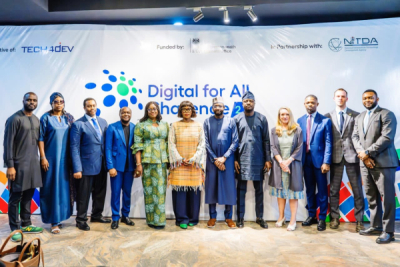In a bid to bolster the nation's digital economy, Tanzanian officials have opted to forge strategic alliances.
Minister of Information and Communication Technologies Nape Nnauye (pictured center) signed a memorandum of understanding (MoU) with NMB Bank executives this weekend in Dar es Salaam. "This agreement aligns with our Ten-Year Digital Economy Strategy (2024-2034)," Nnauye emphasized, highlighting the government's commitment to fostering local tech advancement.
The partnership positions NMB Bank as a key player in Tanzania's digital drive. The collaboration will see the bank co-design crucial digital systems alongside public authorities. Examples include the "Jamii Namba" citizen identification platform and the electronic "Know Your Customer" (eKYC) protocol for streamlined online service delivery.
NMB Bank CEO Ruth Zaipuna (pictured left) welcomed the partnership, stating, "Strengthening the digital economy benefits both NMB Bank and the broader financial sector by enabling improved delivery of financial services across the country."
This move aligns with President Samia Suluhu's vision of a thriving digital economy as a vital engine for Tanzania's development. The country's growing online presence is undeniable, with DataReportal data citing 21 million internet users and 4.90 million social media users as of 2023, translating to a 31.6% internet penetration rate.
Adoni Conrad Quenum
Bosun Tijani's tenure as the Digital Minister has seen a surge in programs aligned with national strategy. This new program is dedicated to enhancing the skills of civil servants.
Nigeria's Minister of Communications, Innovation and Digital Economy, Bosun Tijani (photo, right), announced the launch of DevsInGovernment on Friday, January 26, via social media platform X. The initiative aims to enhance the digital skills of civil servants and improve public service delivery.
"To build a digitally empowered Civil Service for Nigeria, we recently launched DevsInGovernment," Tijani wrote. "This community of technologists and tech enthusiasts in public service will collaborate to drive efficiency in the delivery of public services. They will also champion our Digital Public Infrastructure initiative aimed at transforming public services."
This move aligns with Nigeria's national digital transformation strategy. However, despite government investments, the country lacks a strong e-government presence, ranking outside the top 16 performers in Africa, according to the UN DESA's 2022 "E-Government Survey."
“When we empower these people, when we create the community as a platform for Serendipity a lot will happen. They can collaborate, they can share their pains; they can access resources together and we can also focus on supporting them with continuous personal development as well just to ensure that even as we aspire to deeply use technology, we have the workforce to also back them as well," Tijani explained.
Adoni Conrad Quenum
Fueled by tech ambitions, Nigeria rolls out initiatives with private partners to revitalize its economy and boost citizen empowerment.
Tech4Dev, a social enterprise promoting digital inclusivity in Africa, has launched "DigitalForAllChallenge 2.0," aiming to train two million Nigerians in basic and intermediate digital skills. Backed by the UK's Foreign, Commonwealth and Development Office (FCDO) and Nigeria's National Information Technology Development Agency (NITDA), the initiative targets youth, young adults, and civil servants across all 36 states and the Federal Capital Territory.
"The Digital for All Challenge is a free digital skill-building competition and program to increase digital literacy in Nigeria and ignite interest in obtaining digital skills and certifications using online platforms," stated NITDA.
The challenge unfolds in two stages: training followed by a competitive track. Participants need to pass a post-training assessment to enter the competition, consisting of national, regional, and a grand final stage. Over 150 million naira ($166,657) in cash prizes, laptops, tablets, and other rewards await winners.
DigitalForAllChallenge aligns with the Nigerian government's push for digital literacy, aiming to achieve a 70% rate by 2027 and cultivate three million tech talents. As Kashifu Abdullahi, NITDA Director General, highlighted, this initiative seeks to address both domestic and global talent needs, contributing to the global value chain.
Starting February 5, the program offers three tracks: young learners (8-15), young adults (16-45), and civil servants. This comprehensive approach aims to equip diverse cohorts with essential digital skills, empowering them to participate in the nation's digital future.
Samira Njoya
Through its programs and activities, Innovate Durban promotes an ecosystem where innovation drives economic and social progress.
Innovate Durban, a non-profit company established in 2013 by the eThekwini municipality, fosters a vibrant innovation ecosystem in South Africa's coastal city. Its mission is to stimulate entrepreneurship, drive economic growth, and create jobs through initiatives leveraging the potential of the 4th industrial revolution.
The organization initially served as a forum connecting stakeholders - entrepreneurs, businesses, academia, government, and civil society - within the local innovation landscape. Officially registered as a non-profit in 2017, it has since expanded its offerings to provide practical support for aspiring entrepreneurs.
Innovate Durban boasts a range of services, including virtual and coworking spaces equipped with 3D printers, laser cutters, and other specialized machinery. Its flagship program, The Start Up Support Program, guides innovators from concept to commercialization through a 12-month process with business and technical skill development, prototype funding facilitation, and connections to angel investors.
Design thinking workshops and training programs are offered through Innovation Co-Lab, an innovation center designed to empower individuals and communities. Tailored to meet specific company needs, these programs aim to nurture innovative problem-solving skills, foster new business ventures, create jobs, and tackle social challenges.
The organization's success relies on collaboration with key partners like Open Cities Lab, Standard Bank, Ubuntu, Durban University of Technology, the Aspen Network of Development Entrepreneurs, and the Durban Chamber of Commerce and Industry.
Melchior Koba
In 2023, funding for African startups fell by 40% compared to 2022 with all African technology ecosystems being affected, especially Nigeria.
U.S. Secretary of State Antony Blinken (photo, left) pledged a strong partnership with Nigeria's burgeoning tech sector during a Tuesday meeting with President Bola Tinubu, expressing American firms' eagerness to invest and collaborate.
Nigeria "is a place of extraordinary innovation and dynamism," Blinken said at the State House in Abuja. "I've seen that each and every time, and I expect to see more of that in Lagos tomorrow."
Blinken's remarks underscore the growing interest from U.S. tech giants and venture capitalists in Nigeria's vibrant startup ecosystem, one of the most promising on the continent. According to CB Insights, Nigerian startups raised $224 million in 2023 alone, following a $531 million haul in 2022 and exceeding $1 billion in 2021.
"American entrepreneurs and companies are eager to partner with and invest in Nigeria's economy, particularly in the tech sector," Blinken emphasized. "Our venture capital companies are working to finance them. We want to work in partnership to help drive Nigeria's technological revolution."
He further highlighted the potential for mutual benefit, stating: "One of the things we've learned from these partnerships is that it benefits us as much as any place or any company that we're investing in."
Adoni Conrad Quenum
Upon graduation, he accumulated experience in software testing over several years with various U.S. and French firms. Recognizing technology’s influence, he established Expert Team Tunisia, an initiative aimed at equipping the youth with digital skills.
Tunisian entrepreneur and computer engineer, Salah El Amami (photo), an alumnus of the National Engineering School of Sfax (ENIS) in Tunisia, is the founder of Expert Team Tunisie (ETT), a center for continuing education and professional certification.
Established in 2010, ETT provides a variety of high-quality training courses in information technology and business management. The startup aims to enhance the careers of young individuals and secure their future employment. It currently offers more than 180 themes across eight training areas. To date, it has certified 3,660 learners, conducted 352 training sessions, satisfied 3,956 customers, and delivered 8,448 hours of training.
ETT has also launched an online revision platform, Expertest, for professionals seeking certification and skill assessment. Expertest offers a range of mock exams and corrected exercises, available in packs for each level.
In addition to ETT, El Amami founded Improve Software in 2016, a startup specializing in software testing. Based in France, it provides training services in software testing, both in-person and remotely.
Before his entrepreneurial ventures, El Amami served as a qualification manager at Orange (2011-2012). He has also held the position of test manager at several companies, including QuickPlay Media, an American technology firm, Solocal Group, a French digital marketing company, and SeLoger, a French real estate listing platform.
Melchior Koba
Benin's government has established a dedicated center to combat cybercrime, bolstering its efforts to tackle online threats in the West African nation. The new unit aims to improve investigations and prosecutions of cyber-related offenses, a growing concern across the continent.
Beninese computer scientist Ouanilo Medegan Fagla (photo) was appointed head of the newly established National Center for Digital Investigations (CNIN) on Wednesday, January 24, in a bid to bolster the country's fight against cybercrime.
Fagla, a veteran cybersecurity expert and former Director of Digital Security at Benin's Agency for Information and Digital Systems Agency (ASIN), will now lead the CNIN, aiming to enhance investigations and prosecutions of online offenses.
The Beninese government established the CNIN on November 29, 2023, to continue the fight against cybercrime. The center assumes the responsibilities of the Office central de répression de la cybercriminalité (OCRC) and will take over the cybercrime-related missions of the ASIN.
Before his appointment, Fagla served as ASIN's Director of Digital Security. He is an ISACA-certified information security manager and holds a General Academic Studies Degree (DEUG) in applied mathematics and computer science from the University of Orléans (2004), and a master's degree in computer science from Epitech (2007).
Fagla began his professional career in 2005 at Epitech as an assistant professor. He later became a research expert in reverse engineering at Neuf Telecom, a French ISP, in 2006. In 2008, he joined Bizanga Labs, an email and messaging security company, as a software engineer, a position he also held at Cloudmark, a cybersecurity firm.
Fagla, a former pedagogical director at Epitech (2011-2016), co-founded iNNERSHiP in 2015, a company offering customized development programs for businesses. He served as the Director General of the National Agency for Information Systems Security (ANSSI) from 2019 to 2023.
In 2021, the President of the Republic appointed Fagla as an Officer of the National Order of Benin.
Melchior Koba
Nigeria is pushing ahead with plans to eliminate paper from its civil service by 2030, but the ambitious digitalization drive faces a major hurdle: a lack of necessary skills among government employees.
The Aig-Imoukhuede Foundation, a Nigerian organization championing public sector transformation, has partnered with Microsoft to bolster the digital skills of civil servants across the country.
Formalized on January 19 through the Wootlab Foundation, the collaboration supports Nigeria's ambitious goal of a tech-savvy public sector ready for the digital age.
"This partnership signifies our joint commitment to crafting impactful training programs that bridge the digital divide and drive positive transformations," said the Wootlab Foundation. "Together, we are embarking on an extensive training initiative that will redefine skill development and ensure a workforce well-equipped for the digital future."
This recent collaboration is part of a strategic initiative by OHCSF to ready the public sector workforce for the digital era. The initiative follows the implementation of an enterprise content management solution (ECMS), supported by the Aig-Imoukhuede Foundation, aimed at empowering all work processes. The partnership aligns with the federal government’s goal to train all civil servants in the country in digital skills.
Under this cooperation, the Wootlab Foundation will facilitate the provision of on-demand digital skills for government employees, enabling them to contribute to the digitization of vital public services and stimulate ongoing innovation within the civil service.
It’s noteworthy that Nigeria, through this initiative and others, aims to rank its civil service among the world’s top 20 by 2025 and achieve complete digitization by 2030.
Samira Njoya
Cova, a Nigerian startup offering asset management services, announced its closure in an email to users on Tuesday, January 23. The firm, citing "several factors," will cease operations on February 10, 2024. Cova assured users they would be fully refunded by February 13 at the latest.
As the rapid digital transformation exposes users to cyber threats across Africa, authorities are taking steps to secure the cyberspace, recognizing the crucial role of cybersecurity in fostering sustainable development.
Benin’s parliament on Tuesday approved a law for the ratification of the Malabo Convention on cybersecurity and personal data protection. This move empowers the Beninese government to effectively tackle cybercrime.
The Malabo Convention, aimed at bolstering and harmonizing the ICT legislation of African nations and Regional Economic Communities, became crucial in the wake of the COVID-19 pandemic, which spurred digital transformation across the continent. The convention, which respects fundamental freedoms and human rights, came into effect last October after ratification by Mauritania.
With this ratification, Benin joins 15 other African states that have ratified the convention since its adoption in 2014 in Equatorial Guinea. It will therefore enable the enforcement of that convention as per its Article 36, which requires ratification by at least 15 countries before that implementation. The countries that ratified it before Benin include Angola, Togo, Senegal, Rwanda, Namibia, Niger, Mauritius, Mozambique, Ghana, Zambia, the Democratic Republic of Congo, Cape Verde, Guinea, Côte d’Ivoire, and Mauritania.
Benin’s parliamentarians also ratified the Budapest Convention on Cybercrime, providing an international framework for practitioners in the States Parties to collaborate and establish relations for cooperation in specific cases, especially emergencies, beyond the specific provisions of the Convention.
Adoni Conrad Quenum
More...
Altschool Africa, a Nigerian edtech based in Kigali, Rwanda, is extending its services to Kenya, Techcabal reported last Wednesday. The country is the startup's second-largest market in terms of revenue, after Nigeria and ahead of the UK. "We're not new to the people, but this will give us the opportunity to expand," said Altschool Africa founder Adewale Yusuf.
With climate change disrupting water resources, soil fertility, and crop health across Africa, agricultural entrepreneur Tafadzwa Chikwereti is turning to digital tools to empower farmers and boost their resilience.
Tafadzwa Chikwereti (photo), a young entrepreneur and graduate of the National University of Science and Technology, is the founder of agritech firm Murimi Electronic Agriculture (eAgro), established in 2020.
eAgro’s mission is to bolster farmers’ resilience to climate change, offering a suite of digital tools for climate-smart farming, including data analysis, artificial intelligence (AI), satellite imagery, and an intelligent agronomy tool, Cropfix. The company also provides a credit rating system through Credfarm, facilitating access to affordable financial services for farmers and agribusinesses.
Credfarm assists financial institutions in developing loans tailored to the needs of small-scale farmers by providing an agriculture-specific, data-driven credit risk assessment model.
eAgro’s smart farming platform, Cropfix, uses AI, satellite imagery, and natural language processing to deliver personalized agronomic advice to farmers via text, USSD, and WhatsApp, helping them detect and manage pests and diseases.
Chikwereti has received several accolades for his work. He was a finalist for the Anzisha Prize in 2021, won the Startupper of the Year award from Total Energies in 2022, and was a finalist for the Global Student Prize in 2023. He was also named one of the 12 finalists in the GoGettaz Agripreneur Competition organized by the Africa Food Systems Summit in Tanzania.
Melchior Koba
In recent years, the Egyptian government has made significant investments in the digital sector. This substantial commitment testifies to the crucial importance of outsourcing in stimulating Egypt's digital exports and fostering its economic growth.
Egypt’s digital services export sector saw a significant increase in revenues in 2023, reaching $6.2 billion, a 26.5% rise from the previous year’s $4.9 billion, according to the country’s Minister of Telecommunications and Information Technology, Amr Talaat.
Speaking to the Egyptian Senate on Monday, Talaat attributed the growth to recent foreign investments, including agreements with 74 international and local firms to hire 60,000 outsourcing experts since November 2022. The government’s efforts to boost the number of self-employed workers in the outsourcing industry to 550,000 also contributed to the positive figures.
The investments are part of the Digital Strategy for the Outsourcing Industry 2022-2026, a government initiative launched in February 2022. The strategy targets four key areas: IT services, business process services, knowledge services, and engineering and R&D.
The initiative aims to triple digital export revenues to nearly $9 billion by 2026 and create over 34,000 jobs by 2025, aligning with the sector’s impressive performance. The sector recorded digital exports of $4.9 billion in fiscal year 2021/2022, a significant increase from the $3.6 billion in fiscal year 2018/2019.
Samira Njoya
Technipole Sup Valor is a dynamic hub for entrepreneurial innovation. Focused on socio-economic development, this incubator distinguishes itself by identifying and supporting innovative project leaders.
Technipole Sup Valor is a business incubator founded in 2010 by the National Advanced School of Engineering of Yaounde (NASEY) in Cameroon. Its main mission is "to contribute to the socio-economic development of the country, through the identification and support of young holders of innovative economic projects or those with high growth potential," as stated on its website.
The incubator provides comprehensive support to startups, encompassing entrepreneurship training, consulting and coaching services, financing, and workspace. Incubated companies benefit from dedicated office space, a meeting room, a computer lab with internet access, and access to qualified experts for training and guidance. Technipole Sup Valor also organizes networking events and market research activities to empower founders.
Further bolstering its commitment to entrepreneurial development, the incubator created Technipedia, a dedicated website offering project ideas and valuable information to aspiring entrepreneurs.
Companies receive up to two years of tailored support, including three months within the physical incubator and a maximum of 21 months with ongoing online and remote guidance. While Technipole Sup Valor has a primary focus on the digital sector, its expertise extends to supporting ventures in other fields as well. Its successes include notable Cameroonian startups like Arthur Zang's Himore Medical, Alain Nteff's GiftedMom, and Arielle Kitio's Caysti.
Melchior Koba















